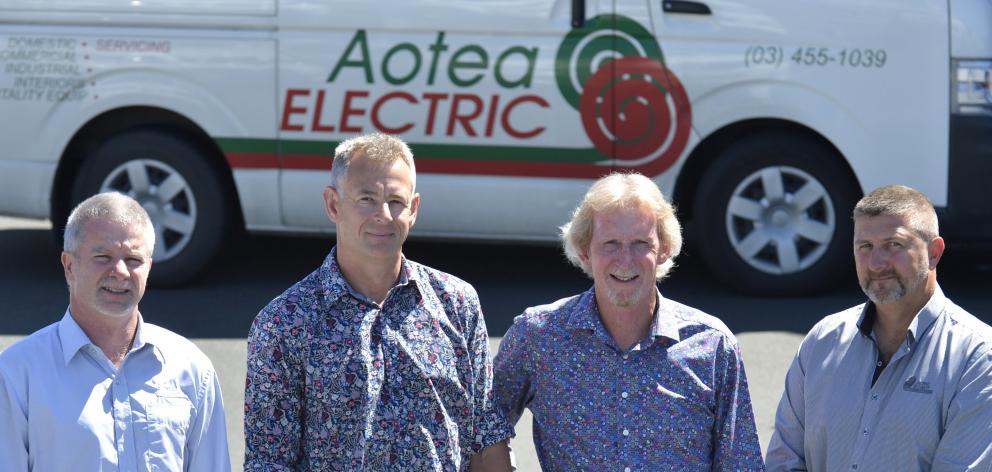
Retaining staff long term is the name of the game at companies under the Aotea Group umbrella. From those who started as apprentices to many of the administrative staff, management and board members, many can count their time at Aotea in the decades.
And that’s just how former group chief executive and chairman and current board member Murray Hughes wants to keep it.
"Retaining people is key ... We want to create opportunities for them, so they don’t look elsewhere," he said.
Aotea had an expansion plan seven years ago, and by 2012 had 18 companies under its umbrella, turnover of $75million and staff of around 380.
At present Aotea has 21 companies operating from 27 locations across the country, with two North Island buy-ins under negotiation in Palmerston North and Whangarei.
Turnover is expected to be $190million this financial year and staffing sits at more than 900 people, including 700 "tool belt" employees.
Aotea is also one of the largest electrical apprentice employers in the country, up from 35 apprentices in 2012 to 170 at present.
"The most recent expansion has been into the North Island, with [already] well-established companies," Mr Hughes said.
Aotea is not a franchise operation, but buys into established businesses, which benefit from the Aotea branding, supplies, computer systems, buying-power and distribution, but the original owners retain a significant shareholding.
Aotea Group Holdings Ltd will typically take a shareholding of between 30% and 50.1%, the latter being controlling stake, so the original owners maintain some measure of independence, but also benefit from growth linked to the Aotea brand.
"We’re not into buying businesses which the owner wants to exit," Mr Hughes said.
Aotea had recently bought into companies in the North Island, and its security systems division was growing and expected to contribute $75million to overall turnover in the current financial year.
"Two additional companies are under due diligence ... When finalised, a significant part of the group’s strategic growth will be completed," Mr Hughes said.
Aotea Group Holdings Ltd chief executive Paul Parsons, appointed last year, said the objective was for Aotea to become a "cohesive group" across the country, delivering the same service levels whether in Kaitaia or Bluff, all under the Aotea banner.
"Aotea Group Holdings Ltd’s directors are mentors for the Aotea businesses around the country" he said.
All accounts were benchmarked internally to improve results, with regular management meetings across all companies to focus on customer service, performances and results, he said.
"We’re more cohesive though sharing ideas, information and resource with specific expertise," he said.
Aotea Electric Southern manager David Ford has spent all but two of the past 31 years employed at Aotea, rising from apprentice to estimator and then to management, before taking up running of the Dunedin operation in July last year. High on his list of priorities were maintaining top workmanship and on-time delivery and staying within the customer’s budget.
On the question of the large amount of work ahead with the University of Otago and Dunedin Hospital rebuild, Mr Ford was upbeat.
"The university and hospital spin-off is a great outlook for Dunedin."
Aotea Security chief executive Alistair Hogg predicts the division will contribute $75million to overall turnover this financial year, from its 12 branches spread across the country from Auckland to Invercargill.
Aotea Security designs, installs and maintains unmanned electronic security systems, including CCTV, primarily for commercial clients such as hospitals, universities, government agencies and large corporates, including big-listed companies.
All of Aotea’s security operations were formally amalgamated into Aotea Security in 2014.
He did not believe, despite the major recent growth rate achieved, that opportunities for the security division were about to plateau across the country.
"We’re looking at more expansion — there is room for growth.
"I’d expect in the next up to five years growth of around 40% in the North Island," he said.
In a volatile construction sector beset with staff shortages, a major advantage was being able to temporarily reassign staff to other divisions, contracts or Aotea companies around the country.
"That’s a very important part of the business, with guys motivated to mobilise and go somewhere for a few weeks," Mr Hogg said.
Staff could be seconded for up to two months.
"This gets everyone across the peaks and troughs," Mr Parsons said.
"Other [Aotea] companies can [also] provide specialist apprenticeship work, which is a benefit for all the businesses,’’ Mr Parsons said.
Business expansion often means increased debt levels but Mr Hughes said Aotea as a group had "limited borrowings", and its recent expansion was 80%-90% "self-funded".
And in the longer term, the company was targeting growth strategies which would boost staff to more than 1000, and "turnover accordingly" to beyond the $200million mark.














